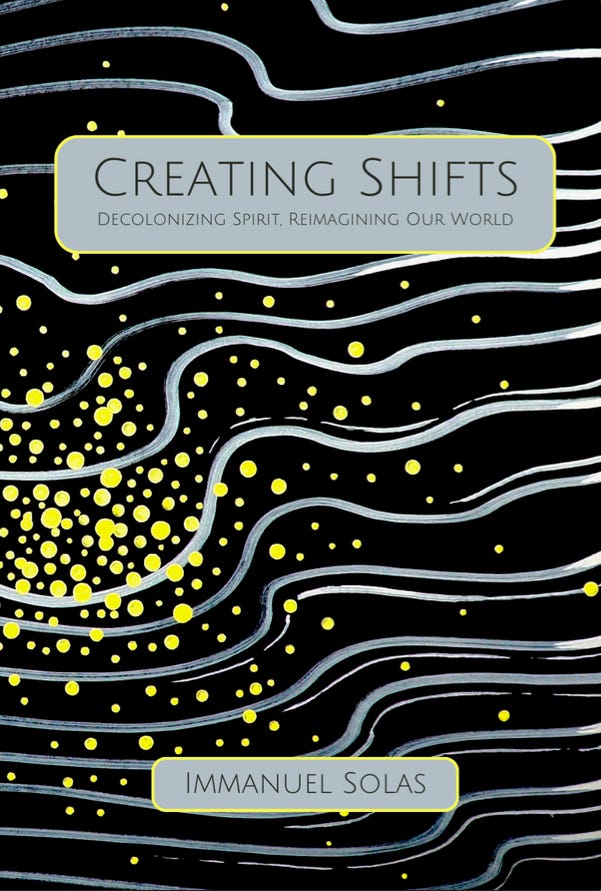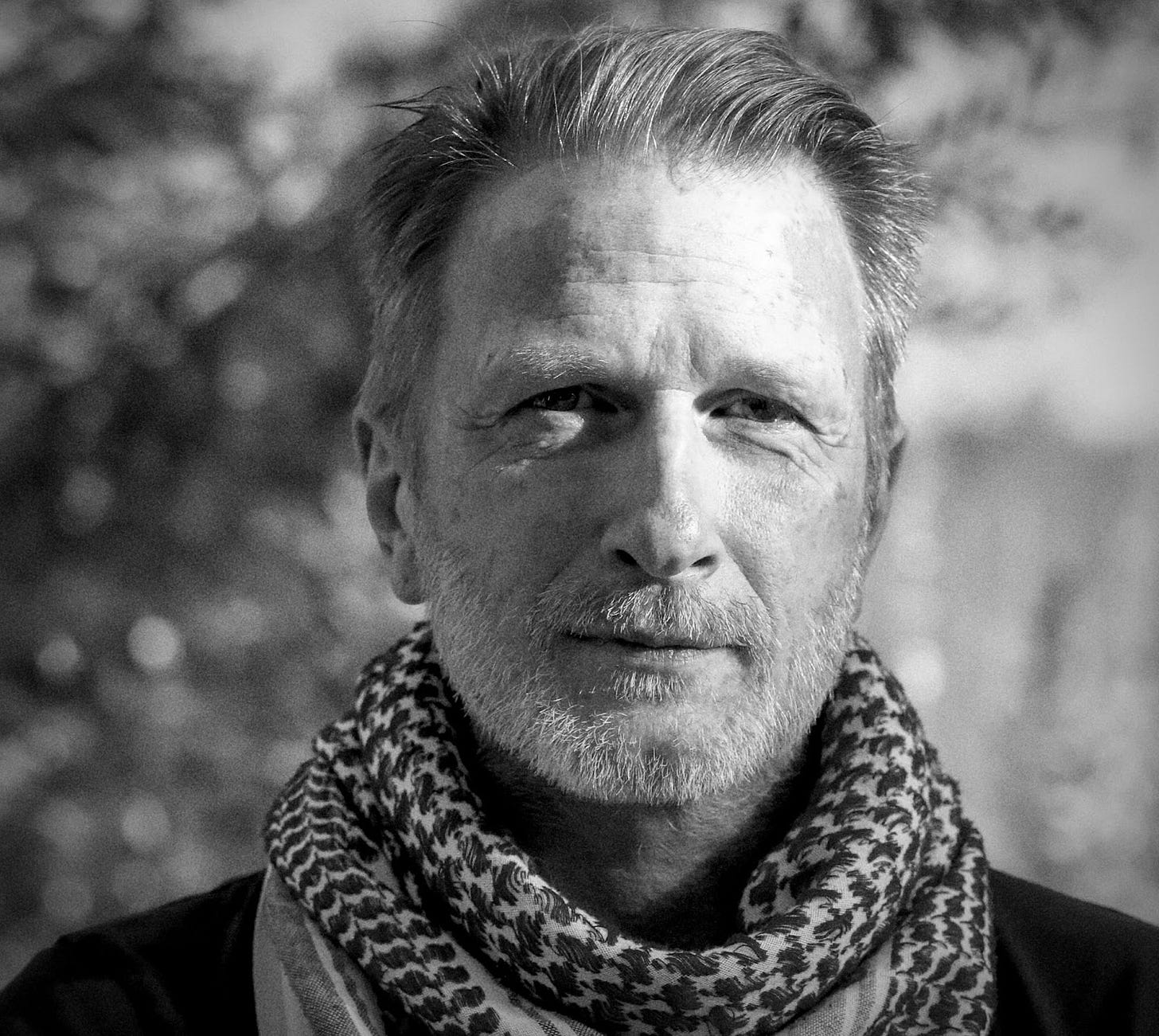Creating Shifts—Decolonizing Spirit, Reimagining Our World
FREE E-BOOK (Full Version) + Media Information
FREE E-BOOK
This digital unabridged version is intended for all to freely read, share, and discuss.
It is not available for commercial forms of distribution—other than those directly licensed by the copyright owner.
Do you prefer a physical book? . . .
Creating Shifts—Decolonizing Spirit, Reimagining Our World by Immanuel Solas aims to challenge and transform the current paradigms of spirituality, activism, and social change. This book seeks to help people decolonize their spiritual practices, exposing the “Consciousness Industrial Complex,” and offering a vision for a more just, inclusive, and harmonious world. By blending insights from Indigenous wisdom, decolonial feminism, and contemporary activism with inner alchemical practices that activate latent creative energies, the book provides a roadmap for individuals and communities to engage in meaningful personal and collective transformation. It serves as both a critique of existing systems and a practical guide for cultivating inclusive communities, nurturing the deep resilience needed for long-term social change.
For more information, please contact:
Immanuel Solas
creatingshifts@gmail.com
CreatingShifts.com
Social Media: @CreatingShifts
G+/YouTube, Meta/IG/FB, Twitter, LinkedIn
FB Profile: https://www.facebook.com/creatingshifts
FB Group: https://www.facebook.com/groups/2183479058522321
Published by CREATING SHIFTS MEDIA.
PUBLISHER’S NOTE: This work specifically addresses the yearning among Millennial and Gen Z readers—as well as those who care deeply about their unique position during these times—for a spirituality that harmonizes inner peace with outward action. As these generations have come of age during a time of unprecedented global challenges, they’ve sought practices and philosophies that can sustain them through uncertainty while empowering them to proactively create positive change. Creating Shifts offers a timely bridge between personal growth and collective liberation, meeting a crucial need for integrated approaches to navigating our complex world.
PRESS RELEASE—FOR IMMEDIATE RELEASE
Contact: Immanuel Solas
Email: creatingshifts@gmail.com
“CREATING SHIFTS” OFFERS GROUNDBREAKING FRAMEWORK FOR SPIRITUAL ACTIVISM IN AN AGE OF POLYCRISIS
January 2025 — In an era marked by unprecedented global challenges, from climate change to ongoing conflicts, Creating Shifts—Decolonizing Spirit, Reimagining Our World emerges as a vital roadmap for integrating spiritual practice with social justice activism. Written by Immanuel Solas, a veteran of the transformational media and publishing industry, this groundbreaking work provides a comprehensive framework for personal and collective transformation.
Drawing on decades of behind-the-scenes experience in spiritual publishing, Solas synthesizes world wisdom traditions, ancient and modern cyclical perspectives on time, and contemporary social analysis to create a compelling vision for planetary healing. The book introduces readers to the concept of the “Consciousness Industrial Complex,” offering an insider’s critique of the commodification of spiritual practices while illuminating paths toward authentic transformation.
At the heart of the book lies the innovative “Receive, Realize, Render™” framework, a practical methodology for creative activism that bridges mystical insight with concrete action. This approach responds directly to the yearnings of Millennial and Gen Z readers seeking to harmonize inner peace with outward engagement in social change.
“Creating Shifts is offered as a crucial addition to the literature on spiritual activism,” says Solas. “Its integrated approach to personal and collective transformation offers valuable insights for anyone seeking to contribute meaningfully to planetary healing during these times.”
The book’s timing is particularly relevant, addressing current global crises while providing tools for long-term resilience and transformation. Through case studies and “Visionary in Focus” profiles, Solas grounds theoretical frameworks in practical examples, making complex concepts accessible to a broad audience.
Creating Shifts includes:
A comprehensive analysis of the relationship between spirituality and social justice
Practical tools for decolonizing spiritual practice
Reflection questions at the end of each chapter
Frameworks for building inclusive communities
Strategies for sustainable activism and social change
Vision for a regenerative future
Special Resource: A Brief Field Guide for Sacred Warriors
Published by Creating Shifts Media, this approximately 111,000-word volume represents a significant contribution to the emerging field of spiritual activism. The book is particularly relevant for spiritual practitioners seeking to engage more deeply with social justice, activists looking to integrate spiritual practice into their work, and young people navigating the complexities of contemporary global challenges.
Creating Shifts: Decolonizing Spirit and Reimagining Our World will be available in January 2025.
###
About the Author:
Immanuel Solas is a seeker, storyteller, and bridge-builder with over 25 years of experience in mission-driven media and publishing. Based in the Ojai Valley* of California, he combines spiritual insights with practical wisdom that can empower individuals and communities to tap into their creative potential for positive change.
*This area, known as ’Awha’y in the Chumash language, is the traditional, ancestral, and unceded territory of the Chumash people, who have been stewards of this land for thousands of years and continue to maintain a vital presence in the region today.
Photo: Natasha Heaszl
SAMPLE QUESTIONS FOR REVIEWERS & MEDIA
The questions below reflect the multifaceted themes explored in my book, spanning personal growth, spiritual activism, systemic critique, and the intersections of race, power, and spirituality in contemporary culture. They delve into concepts such as the commodification of spiritual practices, the role of technology in evolution, intergenerational wisdom, and the integration of Indigenous and decolonial perspectives into modern movements for change.
While I am prepared to engage thoughtfully with these topics, I recognize that many of them address issues where lived experience carries deeper insight than mine. My intention is to contribute to these critical conversations while prioritizing the voices and expertise of those most impacted by systemic injustice.
I welcome opportunities for shared dialogue—whether in panels, co-interviews, or collaborative settings—where marginalized perspectives can take the forefront. It’s my hope that these questions not only provide a foundation for discussion but also inspire reflection on the broader, collective journey toward justice and transformation.
1. Your book introduces the concept of the “Consciousness Industrial Complex.” As someone who worked within this industry for decades, what motivated you to critique it now, and how has your insider perspective shaped your analysis?
2. The term “decolonizing spirit” appears in your title. Can you explain what this means in practical terms for those who might be new to concepts of decolonization?
3. Your work suggests we’re at a critical juncture in human history. What gives you hope for the future, and what do you see as the most crucial shifts needed in the next decade?
4. Your “Receive, Realize, Render™” framework seems to bridge mystical and practical approaches to change. Could you walk us through how this framework developed and perhaps share a concrete example of it in action?
5. The book suggests we’re entering what you call the “Creative Age.” What distinguishes this era from the Information Age, and what implications does this shift have for spiritual practice and social change?
6. You discuss Sri Yukteswar’s interpretation of the Yugas, as well as several other traditional views of great cycles of change, and the Fourth Turning theory. How do these various cyclical views of time help us understand our current global situation?
7. The book includes several “Visionary in Focus” profiles. How did you select these particular individuals, and what do their stories tell us about the future of spiritual activism?
8. You’ve spent 25 years behind the scenes in spiritual publishing. What changes have you observed in how spiritual teachings are transmitted and commodified during this time?
9. The book addresses generational divisions and the importance of intergenerational wisdom. How do you see different generations contributing to the shifts we need?
10. You write about technology and artificial intelligence. What role do you see technology playing in spiritual evolution?
11. Buckminster Fuller’s concept of “trim tab” appears throughout your book. Could you explain this metaphor and why it’s significant for understanding social change?
12. Your book suggests that spiritually bypassing global injustice represents a kind of betrayal. Could you elaborate on this perspective?
13. How has your experience as a father influenced your vision for planetary transformation and the writing of this book?
14. You discuss the importance of embodied activism. What practices do you recommend for maintaining physical groundedness while engaging in social change work?
15. The book proposes some radical reimaginings of economic systems. How do you see the transition from current systems to more regenerative models actually occurring?
16. You write about the integration of Indigenous wisdom without appropriation. What guidelines do you suggest for ethical engagement with traditional knowledge?
17. The book touches on the concept of “spiritual leadership” in times of crisis. What distinguishes authentic spiritual leadership from its commodified versions?
18. You discuss the role of artists as “mystics with a craft.” How can creative expression contribute to social transformation?
19. The book addresses both personal and collective trauma. How do you see the relationship between individual healing and societal transformation?
The questions that follow cut more directly to the systemic critiques presented in the book, potentially generating more provocative and revealing discussions about the intersection of race, power, and spirituality in contemporary culture.
1. You’ve worked with many prominent spiritual teachers and organizations. Are there specific examples of how you’ve witnessed the Consciousness Industrial Complex perpetuating white supremacy while claiming to promote enlightenment?
2. Your book suggests that white feminism has effectively colonized the spiritual marketplace. Can you discuss how this manifests in things like yoga retreats, meditation centers, and wellness spaces?
3. You critique spiritual leaders’ silence on Palestine. How much of this silence do you attribute to financial interests versus genuine spiritual bypass, and what does this reveal about the commodification of spirituality?
4. The book draws a direct line between colonial mindsets and the pricing/accessibility of spiritual teachings. How have you seen spiritual organizations justify charging thousands of dollars for “wisdom” that originated in colonized cultures?
5. You discuss how decolonial feminism offers a more authentic path to higher consciousness than white feminism. Could you elaborate on why white feminist approaches to spirituality often reinforce rather than dismantle oppressive systems?
6. Many spiritual organizations claim to value diversity while maintaining predominantly white leadership. How does this dynamic perpetuate what you call the “master’s spell”?
7. Your book suggests that the Consciousness Industrial Complex has turned trauma healing into a luxury commodity. How does this particularly impact communities most affected by systemic trauma?
8. You write about the intersection of capitalism, white feminism, and spiritual bypassing. How do these forces combine to neutralize spirituality’s revolutionary potential?
9. The book critiques how white spiritual leaders often appropriate and profit from Indigenous and Eastern practices while remaining silent on issues affecting these communities. Can you share specific examples you’ve witnessed?
10. You suggest that many popular spiritual teachings subtly reinforce white superiority through concepts like “manifesting abundance” or “raising your vibration.” Could you break down how these seemingly neutral ideas can perpetuate harmful power dynamics?
11. Your chapter “The Warrior’s Heart” suggests that masculine energy isn’t inherently toxic, but rather has been corrupted by patriarchal systems characterized by control, psychological coercion and intimidation, and brute force. How can men reclaim and redirect their natural protective and nurturing capacities toward planetary healing rather than domination?
12. You write about how men’s “psychic self-mutilation” under patriarchy has contributed to our global crisis. How does your book offer a pathway for men to recover their emotional intelligence without falling into either machismo or passive spirituality?
13. The book discusses how male spiritual leaders have often perpetuated patterns of exploitation even while teaching about enlightenment. What’s the difference between authentic male spiritual leadership and what could be called charismatic bypass?
14. You suggest that men have a particular responsibility to break the silence around injustice, given their historically privileged position. How can men step into this responsibility without recreating patriarchal savior dynamics?
15. The book proposes that men need to embrace both fierce and tender aspects of themselves to be effective agents of change. How might this integration of masculine energies help address global challenges like climate change, militarism, and economic exploitation? What specific practices do you recommend for men undertaking this inner work?






